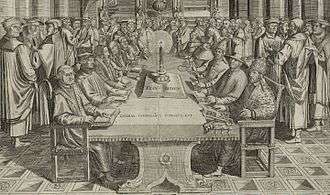Protestant Reformers

| Protestantism |
|---|
 |
| The Reformation |
| Great Awakenings |
| History |
| Culture |
| Demographics |
|
|
| Major branches: |
|
|
|
Transdenominational movements: |
| Related movements: |
Protestant Reformers were those theologians, churchmen and statesmen whose careers, works and actions brought about the Protestant Reformation of the 16th century. Historically speaking, "Protestant" was the name given to those theologians, magnates and delegations present at the Holy Roman Imperial Diet of Speyer in 1529 who protested the revocation of the suspension, granted at a prior Diet of Speyer in 1526, of Edict of Worms of 1521, which had outlawed Martin Luther and his followers.
Precursors
There were a number of people who contributed to the development of the Reformation, but lived before it, including:
Magisterial Reformers
| Protestant Reformation |
|---|
 |
|
|
|
|
|
|
|
By location |
|
Denmark–Norway / Holstein · England · Germany · Italy · Netherlands · Poland-Lithuania · Scotland · Sweden · France · Switzerland |
| Protestantism |
There were a number of key reformers within the Magisterial Reformation, including:
- Theodore Beza
- Martin Bucer
- Heinrich Bullinger
- Johannes Hus
- John Calvin
- Andreas von Carlstadt, later a Radical Reformer
- Wolfgang Fabricius Capito
- Martin Chemnitz
- Thomas Cranmer
- William Farel
- Matthias Flacius
- Caspar Hedio
- Justus Jonas
- John Knox
- Jan Łaski
- Martin Luther
- Philipp Melanchthon
- Johannes Oecolampadius
- Peter Martyr
- Aonio Paleario
- Laurentius Petri
- Olaus Petri
- John Wycliffe
- Jiří Třanovský
- William Tyndale
- Joachim Vadian
- Pierre Viret
- Primož Trubar
- Huldrych Zwingli
Radical Reformers
Reformers of the Radical Reformation and the Anabaptist movement included:
Second Front Reformers
There were also a number of people who initially cooperated with the Radical Reformers, but separated from them to form a "Second Front", principally in objection to sacralism. Among these were:
Counter Reformers
Roman Catholics who worked against the Protestant Reformation included:
- Girolamo Aleandro
- Augustine Alveld
- Thomas Cajetan
- Johann Cochlaeus
- Johann Eck
- Jerome Emser
- Pope Leo X
- John Tetzel
- Thomas More
- Ignatius Loyola
- Francis de Sales
See also
- List of Protestant Reformers (alphabetical)
Further reading
- George, Timothy. Theology of the Reformers. Nashville, Tenn.: Broadman Press, 1988. N.B.: Comparative studies of the various leaders of the Magisterial and Radical movements of the 16th century Protestant Reformation.